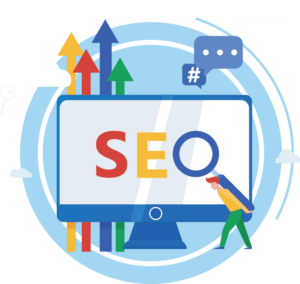Search users who look up local products or services are usually closer to making a purchase decision. This is why it is important to prioritize your Houston Local SEO efforts in order to gain more visibility online and attract more qualified traffic.

The good news is that all of the same link-building and content strategies you use for organic rankings work just as well with local searches. Here are a few benefits of optimizing for local SEO:
Local SEO is an excellent way to get your business’s website in front of people who are looking for what you offer. By optimizing your site for local search, you can attract a targeted audience that is more likely to convert into paying customers. This makes it worth the time and effort to optimize your website for local search.
The most obvious benefit of local SEO is that it increases the number of people who see your website. This is because local SEO ensures that your website appears on the first page of SERP for queries related to your industry and location. By increasing your search engine ranking, you can generate more traffic without having to pay for expensive ads.
In addition to generating more traffic, local SEO also improves the quality of your visitors. This is because these are people who are actually interested in your services or products. This means that they are more likely to convert into sales, sign-ups or inquiries, which makes it a smart investment for your company.
Another advantage of local SEO is that it helps to build trust. When people see your business listed on multiple platforms with consistent information and positive reviews, they are more likely to trust your business. This is especially true if these listings are from reputable sources like online directories and review sites.
Finally, a strong local SEO strategy can help you build backlinks. This is because you can use the same link-building strategies that you would use for your regular SEO campaign. This could include guest posting, reaching out to influencers, or submitting your site to local directories and websites.
As the importance of local SEO continues to rise, it’s important for businesses to invest in this type of marketing. By using a combination of on-page and off-page SEO techniques, you can ensure that your business is visible to the right people at the right times. With a well-optimized website and Google Business Profile, you can start winning loyal customers in no time. This will keep you from having to rely on expensive paid advertising in the future and save you money.
Attract More Customers
Local SEO puts your website in front of more qualified visitors, making it a powerful tool for attracting new customers. Unlike general searches, which could bring in anyone who is browsing on a computer or smartphone, local searches tend to focus on specific products and services. That means they are more likely to lead to sales and other positive business outcomes.
A local search engine optimization strategy will help you target users searching for the product or service that your business offers, optimizing your website with relevant keywords, listing your address and phone number in online directories and listings, and adding local content to your website. Using the right local SEO techniques will also increase your chances of ranking above competitors without a dedicated strategy, in the map pack and organic search results.
Consumers are increasingly preferring small, independent local businesses over large corporate chains for a more personalized experience and to support the community. Local SEO will give your brand the visibility it needs to tap into this trend and compete with larger companies in your area.
It’s important to note that just like with regular SEO, a successful local strategy requires consistent work. Creating and updating fresh content, maintaining a high review count on your Google Business Profile, submitting quality backlinks, and responding to negative reviews are all great ways to improve your local SEO.
In addition, incorporating user-generated content (UGC) into your local SEO strategy will boost your credibility and build trust with potential customers. This can include customer testimonials, reviews, influencer-sponsored posts, and guest articles. Whether on your GBP, website, or social media, UGC will make your brand seem more real and trustworthy to local shoppers, helping you stand out from the competition.
Local SEO is an essential tool for all businesses seeking to compete in their respective markets, whether it’s a dentist in Brooklyn or a fitness studio in Manchester. The benefits of a well-optimized local SEO strategy are numerous and can lead to an increased flow of traffic, sales, and other positive outcomes for your business.
Less Reliance on Paid Advertising
Local SEO increases your visibility and boosts your rank on search engine results pages (SERPs) for searches with a local scope. By promoting your business to relevant local audiences, you can reduce your reliance on paid advertising campaigns to generate traffic and conversions.
One of the biggest benefits of local SEO is that it allows you to target customers who are ready to buy. Searchers who find your site through organic SERPs or local pack results have already identified a need and selected you as a potential solution. This makes these users “warm leads” that you can convert into paying customers more quickly than other types of searchers.
Another big benefit of local SEO is that it can increase customer trust. This is because local SEO strategies can help you build an online reputation that demonstrates your credibility and relevance. By encouraging your happy customers to leave reviews and addressing negative feedback promptly and professionally, you can build trust and create loyal customers.
A final benefit of local SEO is that it can drive more phone calls to your business. This is because people who discover your business through local search are often looking for services or products that you sell in-person. Adding click-to-call functionality to your Google Business Profile and including links on your website that allow users to call you directly can improve user experience, boost conversions, and free up busy staff members from answering phone calls.
If you’re serious about growing your local business, it’s time to invest in local SEO. By optimizing your Google Business Profile, claiming your business listings on other popular directories, and collecting and managing reviews on consumer review websites like Yelp, you can increase your chances of appearing prominently in local search results and generating more high-quality, qualified traffic. Then, you can focus on providing exceptional service and converting new customers into long-term loyal clients.
Improved User Experience
One of the most significant benefits associated with local SEO is that it provides a better user experience. This is particularly true for mobile users. Many searchers are on the go and looking for information about a business or service in their immediate area. They don’t want to have to dig around for that information, which is why local SEO is so important. In fact, mobile searchers have a much higher likelihood of clicking on and contacting a business they see in the local pack compared to non-local results.
This type of targeted traffic is more likely to turn into leads, sales, sign-ups, and visits to a physical store or office. Local SEO also helps build brand trust and reputation, which leads to repeat customers who spend more money on your products or services over time.
Another great benefit of local SEO is that it brings ready-to-buy visitors to your website or physical location. This means you don’t have to warm them up or push them towards buying something. Instead, they’ve already done their research and picked your company as a potential solution to their problem.
As the world of SEO continues to evolve, it’s becoming increasingly important for businesses to focus on local search optimization. This way, they can target people who actually need their products and services, rather than just those who are interested. Investing in local SEO will help your business grow in the most effective way possible.
Local SEO is an excellent way to increase your visibility in local searches and snack packs, but it takes a lot of work to get there. That’s why it’s important to have a team of professionals handling your local SEO. They can help you improve your rankings and ensure all of your online listings are accurate, up-to-date, and optimized for local search. With tools like Semrush’s Position Tracking, you can keep track of your rankings for local keywords and monitor your performance over time. This tool can also help you discover keywords that are driving traffic to your competitors, which is useful for planning your next move.
